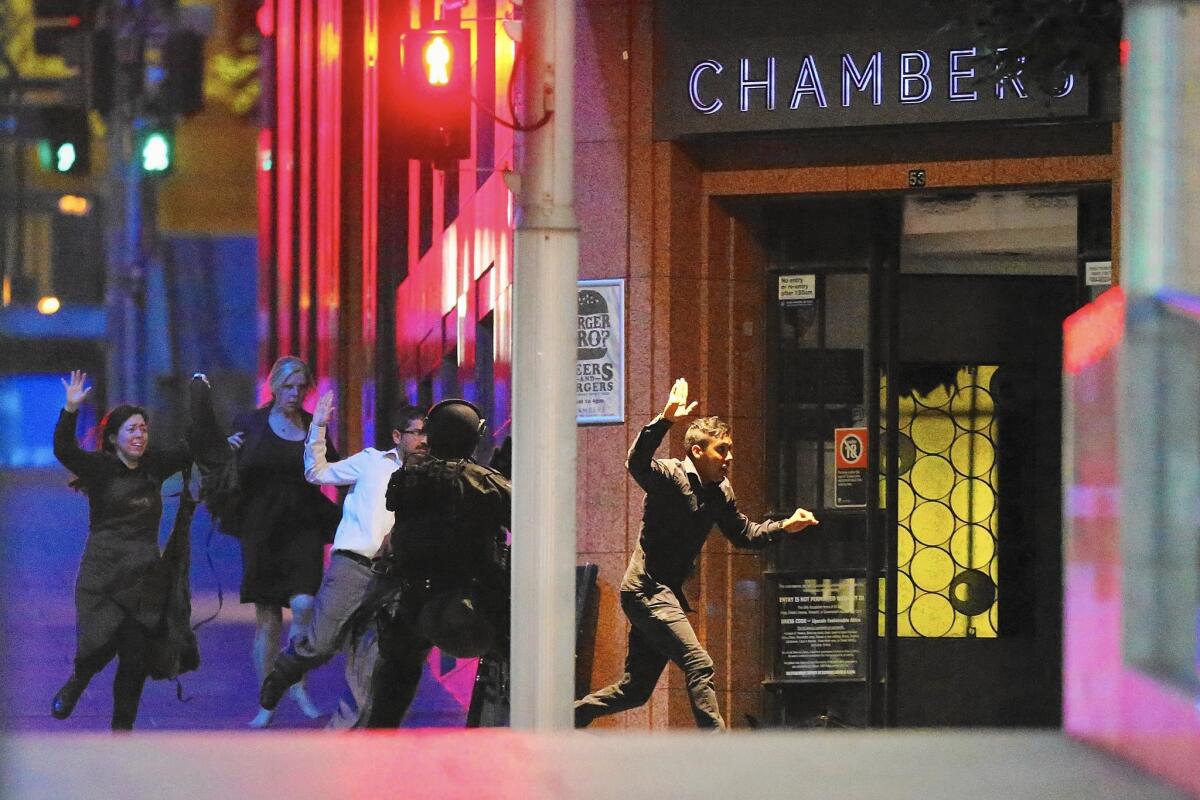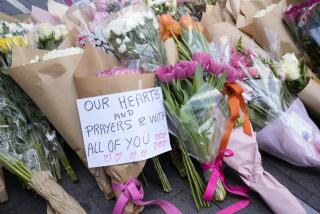In Australia, Sydney siege inquiry continues amid grief, questions

- Share via
Reporting from Sydney, Australia — As the investigation of Sydney’s deadly hostage siege continued Tuesday, thousands of Australians paid tribute to the victims, pouring out their grief and leaving flowers near the crime scene at a busy downtown pedestrian thoroughfare.
Initial reports suggested that the gunman, an Iranian-born self-declared Muslim cleric named Man Haron Monis, acted as a lone wolf. He died in the siege’s violent end, along with two hostages. But authorities were closely holding details of the inquiry and treating it as a national security matter.
As Australians were asking why Monis, who had numerous run-ins with the law and was charged with being an accessory to the 2013 killing of his ex-wife, was out on bail, police on Tuesday spent three hours at the home of Amirah Droudis, Monis’ former partner. Droudis, who stands accused in the slaying as well, also has been free on bail.
Neither Monis nor Droudis have been tried in the death of Noleen Hayson Pal, 30, who was burned and stabbed to death in April 2013. It was unclear what police were searching for at Droudis’ home in the west Sydney neighborhood of Belmore.
“Why was such a person outside the walls of a prison?” asked Australian journalist and lawyer Richard Ackland, a regular contributor to the Guardian newspaper, referring to Monis. “How come he fell through the cracks in the criminal justice system? Why wasn’t the security apparatus more vigilant?”
Iranian journalist Sadegh Ghorbani said Tuesday that Iranian officials had repeatedly warned Australian authorities about Monis’ “mental condition.” Iranian officials have said that they requested Monis’ extradition 14 years ago, but that Australia refused to hand him over because there was no extradition agreement between the two countries.
Legal experts said Monis had been able to plead special circumstances to secure his release on bail. Changes to the New South Wales state Bail Act that took effect in May would have made it tougher, though not impossible, for a person in his circumstances to get out on bail. Further changes are to come into force next year.
New South Wales Atty. Gen. Brad Hazzard said in a statement that if all the amendments had been in effect, the new bail law would have ensured that Monis remained in custody.
“This government changed the Bail Act to ensure greater safety for our community. It was changed to ensure that offenders involved in serious crime will not get bail,” he said Tuesday.
But Sydney-based criminal defense lawyer Michael Coroneos, whose law partner Adam Houda represented Monis in another case — in which he was convicted of sending offensive letters to families of Australian soldiers — said the situation was more complicated than Hazzard suggested.
“Generally speaking, it would have been harder for him to get bail, but not impossible,” Coroneos said in an interview. “Under the new Bail Act, the focus was then placed onto the offender himself ... [whether] as a matter of fact, there was an unacceptable risk of the person re-offending.”
A number of observers, including members of Pal’s family, have criticized Australian authorities for granting Monis bail. Coroneos said that was understandable “but the reality of the situation is that the law in this country — as it is in [the U.S.] — is that a person is innocent until proven guilty beyond reasonable doubt.
“There is no law here of what is called ‘preventative detention,’ which is what the media is effectively saying, that this person should have been locked up as a means of preventive detention,” the lawyer said.
Prime Minister Tony Abbott acknowledged that systems to monitor threats and prevent such attacks failed in this case.
“The system did not adequately deal with this individual, there’s no doubt about that,” he told a radio station. “We’ve got to be constantly asking ourselves, ‘Is this the best we can do?’ ”
Near the Lindt Chocolat Cafe in downtown Sydney where Monis took 17 people hostage, Abbott joined thousands of mourners who came to pay tribute, leaving flowers and cards.
How the two hostages died remained unclear Tuesday. They have been identified as Katrina Dawson, 38, a lawyer, and Tori Johnson, 34, the cafe manager.
“We are so proud of our beautiful boy Tori, gone from this Earth but forever in our memories as the most amazing life partner, son and brother we could ever wish for,” Johnson’s family said in a statement.
Authorities admonished the surviving hostages to not publicly discuss details of what Monis said or did in the cafe during the siege.
But Ji-eun Bae, who worked at the eatery and fled with four others after being held for eight hours, told the Special Broadcasting Service of Australia that another cafe worker, Elly Chen, had encouraged her to run away when the opportunity arose. Chen fled seconds behind Bae about 5 p.m. Monday.
Four additional hostages fled at the end of the more than 16-hour siege, when police stormed the cafe. Authorities later said they had heard at least one gunshot and believed the hostages were in immediate danger.
Bae said that throughout the ordeal, she was determined to survive. Expressing grief over Johnson’s death, she said she “can’t believe he’s gone.”
The Sydney Morning Herald identified the other 13 survivors as cafe employees, an 83-year-old man, a 75-year-old woman, and several lawyers and professionals who work in a nearby office building.
Several remained hospitalized as of Tuesday evening, including three women who suffered gunshot wounds.
Special correspondent Booth reported from Sydney and Times staff writer Makinen from Beijing.
More to Read
Sign up for Essential California
The most important California stories and recommendations in your inbox every morning.
You may occasionally receive promotional content from the Los Angeles Times.











